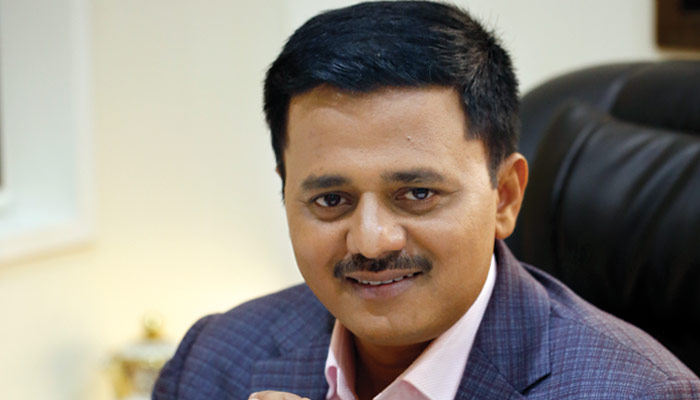A veteran in the world of cooperative credit organizations, Mahadeo Jadhav, the Atulya Group Founder, Chairman and Managing Director, established Atulya Nirman Micro Finance Association, in 2013 with a vision and commitment to empower the downtrodden sections of the society. Now the flagship company is a diversified business conglomerate with interests in microfinance, agro-business, e-commerce, NBFC, renewable energy, and blockchain solution. The microfinance venture is empowering the weak, especially women, whereas the agro-business endeavours promise to sow the seeds of prosperity across farmlands.
Agro Champ, a leading farm sector enterprise of the Atulya Group, has changed the fortunes of farmers in Maharashtra by introducing contract farming. Many debt-ridden farmers of villages around Ahmednagar who had given up agriculture and were migrating to nearby towns and cities, came back home. The contract farming succeeded in reversing the depressing trend. An appropriate financial support was offered to them for growing a variety of crops and dry storage facilities were provided to stock their produce. The company also signed a long-term contract, offering a fixed price higher than what they were getting earlier which led to an increase in production. Besides, the Atulya Group is making robust forays into new ventures – such as e-commerce, renewable energy and non-banking finance company (NBFC) sectors.
Under Mr Jadhav’s dynamic leadership the Company has ventured into segments with high-potential growth. No wonder, the Atulya Group has jumped the solar energy bandwagon by forming a joint venture with Infra Solar Tech Solutions. Always keen to diversify, the Group is making a splash with blockchain technology and has a subsidiary Atulya Multi Technologies, based in Singapore, which provides specialised, blockchain-based solutions.
Atulya Group is today emerging as a fast-growing, diversified, business conglomerate managed by energetic and qualified professionals. Mahadeo Jadhav has emerged as a leading social entrepreneur marking the beginning of business-driven social upliftment. In a freewheeling chat with Indian Economy & Market in his rather very soft and humble voice he spoke about Atulya and his future plans.
What led you to set up Atulya?
My long association with cooperative credit societies gave me an opportunity to see poverty and its ill effects from close quarters. It was during my innumerable interactions with the poor that I vowed to end this misery of downtrodden people. I was more than convinced that microfinance would be the right weapon to battle poverty and empower the poor. And that opportune time arrived in 2013, when I realized my dream by setting up Atulya Nirman Micro Finance Association. Since then we have been designing innovative products to provide financial support and services to the downtrodden, especially women. It is enabling them to become small entrepreneurs and create a better future for themselves and their families. The microfinance company is playing a vital role in bringing financial security, self-esteem and entrepreneurial drive among the rural, semi-urban and urban poor and giving them sustainable, livelihood opportunities.
So the focus is primarily on the weaker section?
Yes, because it is that segment which has nowhere to go. Atulya Nirman Micro Finance is run by experienced industry professionals. The Company focuses on developing and making use of innovative technology to deliver its services and enrich the community at large. It has been mobilising resources to support people for sustainable, income generating enterprises. The company has been making efforts to train rural and urban poor in simple skills.
What is the model of your agro-business?
I was saddened to see that many debt-ridden farmers of villages around Ahmednagar had given up agriculture and were migrating to nearby towns. So we introduced contract farming in 2015 which has succeeded in reversing the depressing trend. Migrated farmers came back when we offered an appropriate financial support to them for growing a variety of crops. Dry storage facilities were also provided to stock potatoes, tomatoes, cabbages, onion, green chillis and other vegetables. The company also signed a long-term contract, offering a fixed price higher than what they were getting earlier. This led to an increase in production and provided an opportunity for farmers to export their produce to countries, like the UAE, Saudi Arabia, Sri Lanka, Malaysia, Bangladesh, Myanmar, and Singapore. The phenomenal success of contract farming has inspired around 1,000 farmers with more than 4,000 acres of cultivatable land to enter into a contract with the company for farming. Moreover, the company has emerged as a prominent trader, exporter and supplier of fresh fruits and vegetables.
“Our technology-centric and business-driven plans and products have only one focus – to empower weaker sections of society.”
You are into organic farming?
A group company Ample Tree Agro Mart has drawn a roadmap to enter the organically-grown farm products category through its mobile stores under the brand name Pure Agro Mart which aims at direct sales of fresh farm products to domestic and International consumers straight from the farms. With the direct sales of farm produce, Pure Agro Mart achieves the twin objectives of consumers getting quality products at reasonable prices and farmers getting fair prices with middlemen eliminated. Farm fresh products will reach consumers’ doorstep through the company’s high-tech vans, equipped with features, like GPRS.
But these are perishable goods. How you are going to tackle this?
That’s correct. To overcome this, the Company is planning to enter cold storage and food processing business. Cold storage and food processing will help us to process perishable products from farms, store them and send them to the market when good prices are available.
How the e-commerce division Atulya Ventures is working?
Atulya Ventures, was set up in 2017. We had launched the payment system, ASK Wallet, on a pilot basis towards the end of 2016 with services, such as mobile prepaid re charge and post-paid bill payment, utility bill payment and money transfer. The objective of the company was to provide all e-commerce services from a single platform. The pilot project itself was a huge success, and we were able to enroll more than 3,000 retail units, over 50 distributor channels and over 1,00,000 registered users.
How you’re going to expand it?
We have a tie-up with Bharat Bill Payment System, which has helped ASK Wallet to expand its reach and services. Atulya Ventures is in the final testing stage of its phase-II products, which include services and offers of day-to-day needs. The company is targeting to tap consumers in tier-II & III cities and towns and looking at enlisting at least 50,000 retail outlet for B2B operations and 10,00,000 registered users for B2C transactions by December 2020. Besides, ASK Wallet has drawn a plan to launch its services in Myanmar, Indonesia, Bangladesh and other countries.
You had shown a keen interest in some NBFC? How is the progress?
After rich experience in cooperative credit and microfinance segments, our next move is certainly towards the NBFC segment. We are in the process of taking over an NBFC with RBI licence. Atulya Ventures is set to merge its ASK Wallet business into the NBFC company. With the merger we expect volume of business to grow by around 30 times in the next two years.
You are also into solar energy?
Yes, we have formed a joint venture with Infra Solar Tech Solutions, which has vast experience in solar photovoltaic (PV) and thermal solar panels. With this we hope to commercialise alternative technologies for green and efficient energy generation systems. The company has introduced the most economical and very useful Solar Panel enabled electric system in Khed Tehsil in Ratnagiri District of Maharashtra.
It is our dream to take this innovative product to each and every village of the country to drastically reduce the problem of inadequate or no supply of electricity, so that the youth and students in these rural areas can study properly.
“We are strongly committed to make Atulya group really big globally. With the blueprint of various business initiatives in several States and countries, we are well set to establish Atulya as a truly Indian, multinational business house.”
What is your revenue target?
The Atulya Group is poised for a big leap with renewed focus and energy. An ambitious target of Rs500 crore of revenue by 2020 has been drawn up and a blueprint to achieve it is being put into action. Our company is focusing on developing and making use of innovative technologies to deliver services and promises. Our core businesses and new ventures are set to achieve this target.
Atulya has made a splash with blockchain technology. How is it?
Our group Company Atulya Multi Technologies, based out of Singapore, provides specialised, blockchain-based solutions for the agriculture sector called Agrow, which eliminates middlemen from post-harvest production and distribution. It provides a decentralised marketplace that uses smart contracts to create a direct financial interaction between farmers and buyers. The purpose of Agrow is to innovate in crop production, storage and distribution besides overcoming problems that have been occurring at all stages of the current production and distribution channels. Agrow includes creation of key verticals, namely, Agrow Mart – a unique marketplace connecting crop producers and consumers by eliminating multi-level distribution channels; Agrow Chain – blockchain-based smart contracts to track movement in a supply chain journey; and Agrow Storage – smart storage solutions which plays an important role in the supply chain management.
You seem to be very enthusiastic about Agrow?
Farmers are the backbone of our country but the situation they are in is not very good. Consortium of Indian Farmers’ Association (CIFA) had put their demands to all political parties before the 2014 general elections. Their demands were: Give us Technologies – We will increase Productivity; Make investments – We will make it Sustainable; Give us Freedom to market – We will increase Profitability. Agrow platform will fulfill all these demands. It has all the three solutions – Technology, Investment and Freedom to market. Only difference is that it is from a private enterprise. After understanding the benefits of Agrow platform, we’ve chosen the best team both in management and technology through meticulous planning. Agrow will certainly become the best platform for both producers (farmers) and consumers by directly connecting them, thus drastically eliminating the complicated, high-cost and multi- level distribution structure with entry barriers and inefficiency of information.
What are the future plans?
As I told you earlier, we are setting up 12 cold storage facilities across Maharashtra and Gujarat, 20 hectares of hydroponics in Maharashtra besides bringing 20,000 hectares under contract farming by 2020. The company’s advanced farming technologies are facilitating farmers to produce high-quality, organic yield and to produce more with less water. Agrow has around 7200 farmers ready to join its platform and we aspire to bring whopping 2.5 crore farmers from across the globe on its platform. Under contract farming, over 4,000 acres across Maharashtra and Gujarat are being cultivated. The platform is looking at more number of contracts with farmers in Gujarat to grow 5,000 tonnes of pomegranates per year. The company has already set up storage facilities with a capacity of 2500 tonnes of onions across five acres in Parner in Maharashtra.
Do you feel there are areas in which MFIs will see a major transformation?
I feel that MFIs will need to broaden their range of loan products to include housing loans, clean energy loans, working capital loans, as well as other financial products such as micro-insurance. This will necessitate diversifying the customer segments from the current group-lending segment to adjacent and more affluent segments. New age players will use data, machine learning and artificial intelligence to help MFIs with digital onboard and more efficient credit assessment.
How do you see the future of microfinance?
MFIs are prone to shocks, which can be political, environmental, economic or financial and such events affect the repayment capability of MFI customers. Although such jolts are natural to any model and are manageable through caution and provisioning, the current regulations and business models of MFIs have no such provisions. The regulators should consider allowing MFIs to accept deposits. Given the high operating cost model and future investments that MFIs will have to make in technology, it is necessary to explore models that ensure the viability of the MFI business model. Technology, consolidation and new financial entities will redefine how microfinance is delivered in the future.
Don’t you feel that microfinance has reached an important inflection point in India? What are the imminent challenges?
Fintech is reshaping financial services and particularly the microfinance sector in many ways. Most large and established microfinance companies have transformed into small finance banks and will have access to deposits and greater operational leverage. Microfinance will need to respond to these transformative changes in the ecosystem by embracing technology, establishing enduring partnerships, diversifying product portfolio and moving beyond the traditional group lending model. Atulya is among the leading microfinance companies which are in the forefront of this exciting transformation unfolding in the microfinance sector.






















